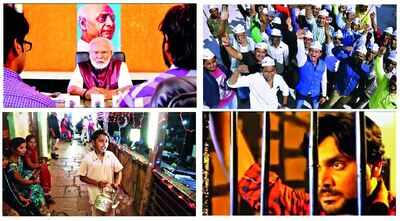- News
- entertainment
- gujarati
- movies
- Will D-Town make more political dramas despite CBFC snub?
Trending
This story is from April 16, 2019
Will D-Town make more political dramas despite CBFC snub?
The Gujarati film industry says CBFC not a deterrent

After a lot of drama, the release of the Vivek Anand Oberoi starrer PM Narendra Modi was stalled by the Election Commission recently for violating the model code of conduct. Bollywood’s tryst with politics is nothing new, and several Hindi films have courted controversy in the past owing to their political content. But closer home, Dhollywood has, surprisingly, remained coy when it comes to making films on politics. Apart from the recently released Saheb starring Malhar Thakar, most other recent films on politics were either delayed or rejected by the CBFC for their content. Films like Salagto Sawal Anamat and Power of Patidar, based on the Patidar Anamat Andolan of 2015, were initially asked to comply with numerous cuts but were denied a release date eventually. Films like Namo Saune Gamo never released either, while Hu Narendra Modi Banva Mangu Chu was delayed for more than a year as it didn’t get clearance from the CBFC, before finally getting a clearance from the censor board earlier this year. Given these not so pleasant experiences, is the Gujarati film industry still willing to make more such films?
Apart from the recently released Saheb starring Malhar Thakar, most other recent films on politics were either delayed or rejected by the CBFC for their content. Films like Salagto Sawal Anamat and Power of Patidar, based on the Patidar Anamat Andolan of 2015, were initially asked to comply with numerous cuts but were denied a release date eventually. Films like Namo Saune Gamo never released either, while Hu Narendra Modi Banva Mangu Chu was delayed for more than a year as it didn’t get clearance from the CBFC, before finally getting a clearance from the censor board earlier this year. Given these not so pleasant experiences, is the Gujarati film industry still willing to make more such films?
CBFC’s rejections not a deterrent for filmmakers
Despite being one of the most preferred forms of entertainment in India, with a huge reach to boast of, filmmakers feel that films are always a soft target. And political films have come under the scanner for several reasons. “Our film was based on real incidences, and was made without any intention of hurting anyone’s sentiments,” says filmmaker Rajesh Gohil, whose film Salagto Sawal Anamat was rejected by the censor board in 2016. He adds, “So many Bollywood films are made on politics and they are released across India. So, I don’t know why our film was rejected by the CBFC.” Filmmaker Mahesh Patel expresses similar sentiments, “Power of Patidar was based on the Patidar Andolan and the censor board objected to the fact that we had used real names. But what about numerous Hindi films that have been made on real life political leaders? They never faced such issues.”
But D-Town filmmakers remain unperturbed and say that even though these films could not be released, it will not stop them from making a film that they believe in. Says Mahesh, “Recently, I wanted to register a title for my next film, which will be on the happenings in February, 2002, but it was rejected by the committee. But I haven’t dropped the idea of making the film. Filmmaking is my choice and that’s what I do. Even if I face resistance from various committees, I will make a film if I have a story that needs to be told, and if I feel the subject will have an impact on the audience.”
Given that politics is a sensitive topic, many believe that a political film needs to be treated and handled with care. Filmmakers should make sure that they don’t hurt people’s sensibilities. Says actress Jhinal Belani, whose films Dhantya Open and Order Order Out of Order had political undertones, “Right now, the atmosphere is such that you end up hurting someone or the other with whatever you say. In such times, if we make a film that addresses a sensitive topic, then we should be extra careful about how we handle it.”
However, she quickly adds, “Being sensitive, and ensuring that your work doesn’t hurt people, doesn’t mean that you curb your creative freedom. You can say whatever you want to in a smart way, without having a negative impact on anyone.” The industry insiders also agree that it is important to be careful while making a political film, since it has the potential to invite trouble. “We took a lot of things into consideration while making Order Order Out of Order, as we didn’t want to invite unnecessary trouble. We didn’t want to go wrong with our facts while dealing with a sensitive topic,” says actor Raunaq Kamdar.
Does CBFC give preferential treatment to Bollywood?
Dhollywood’s tussle with CBFC is not new, says filmmaker Shailesh Prajapati, whose film Saheb on student politics released recently, “I made a film in 1999, and CBFC objected about some very banal word used in the film. Regional films have always been treated differently than Bollywood films, and they face stricter scrutiny by the censor board,” says Shailesh. But the filmmaker says these things don’t matter to him and he will make a political film if he finds an interesting story, “We don’t have to depend on a theatrical release these days, as there are many OTT platforms where you can release your film. So, if I have a topic that interests me, I will make a film on that.”
Will D-Town offer us some political biopics and political dramas in the near future? Let us wait and watch!

CBFC’s rejections not a deterrent for filmmakers
Despite being one of the most preferred forms of entertainment in India, with a huge reach to boast of, filmmakers feel that films are always a soft target. And political films have come under the scanner for several reasons. “Our film was based on real incidences, and was made without any intention of hurting anyone’s sentiments,” says filmmaker Rajesh Gohil, whose film Salagto Sawal Anamat was rejected by the censor board in 2016. He adds, “So many Bollywood films are made on politics and they are released across India. So, I don’t know why our film was rejected by the CBFC.” Filmmaker Mahesh Patel expresses similar sentiments, “Power of Patidar was based on the Patidar Andolan and the censor board objected to the fact that we had used real names. But what about numerous Hindi films that have been made on real life political leaders? They never faced such issues.”
But D-Town filmmakers remain unperturbed and say that even though these films could not be released, it will not stop them from making a film that they believe in. Says Mahesh, “Recently, I wanted to register a title for my next film, which will be on the happenings in February, 2002, but it was rejected by the committee. But I haven’t dropped the idea of making the film. Filmmaking is my choice and that’s what I do. Even if I face resistance from various committees, I will make a film if I have a story that needs to be told, and if I feel the subject will have an impact on the audience.”
Political films need to be handled with care
Given that politics is a sensitive topic, many believe that a political film needs to be treated and handled with care. Filmmakers should make sure that they don’t hurt people’s sensibilities. Says actress Jhinal Belani, whose films Dhantya Open and Order Order Out of Order had political undertones, “Right now, the atmosphere is such that you end up hurting someone or the other with whatever you say. In such times, if we make a film that addresses a sensitive topic, then we should be extra careful about how we handle it.”
However, she quickly adds, “Being sensitive, and ensuring that your work doesn’t hurt people, doesn’t mean that you curb your creative freedom. You can say whatever you want to in a smart way, without having a negative impact on anyone.” The industry insiders also agree that it is important to be careful while making a political film, since it has the potential to invite trouble. “We took a lot of things into consideration while making Order Order Out of Order, as we didn’t want to invite unnecessary trouble. We didn’t want to go wrong with our facts while dealing with a sensitive topic,” says actor Raunaq Kamdar.
Does CBFC give preferential treatment to Bollywood?
Dhollywood’s tussle with CBFC is not new, says filmmaker Shailesh Prajapati, whose film Saheb on student politics released recently, “I made a film in 1999, and CBFC objected about some very banal word used in the film. Regional films have always been treated differently than Bollywood films, and they face stricter scrutiny by the censor board,” says Shailesh. But the filmmaker says these things don’t matter to him and he will make a political film if he finds an interesting story, “We don’t have to depend on a theatrical release these days, as there are many OTT platforms where you can release your film. So, if I have a topic that interests me, I will make a film on that.”
Will D-Town offer us some political biopics and political dramas in the near future? Let us wait and watch!
End of Article
FOLLOW US ON SOCIAL MEDIA







